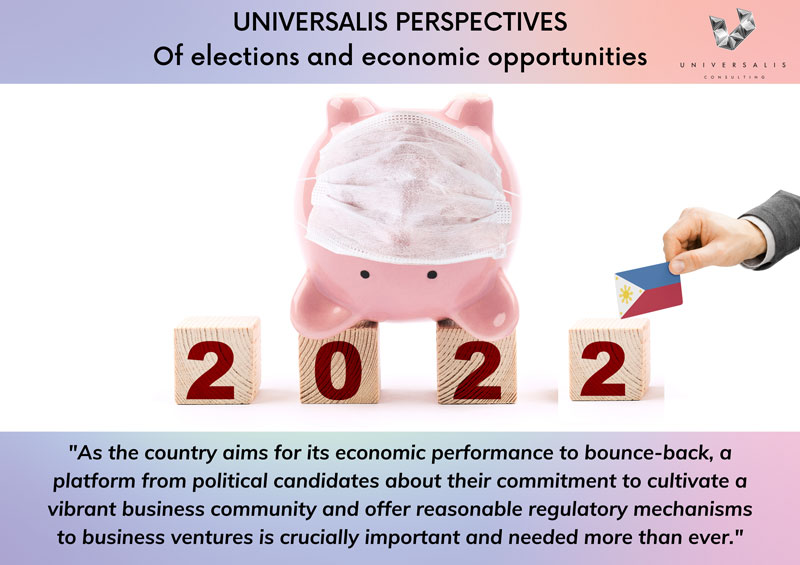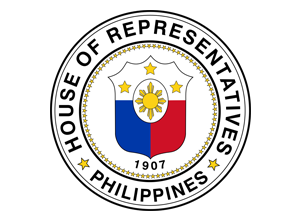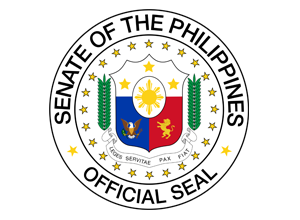Universalis Perspectives: Of elections and economic opportunities

As vaccines are expected to arrive in the Philippines within the first two quarters of 2021, clamors of who shall run for presidency in 2022 have started to gain traction as Filipinos await who will file presidential candidacy this coming October. At present, citizen-led movements commenced their campaign to convince certain personalities to consider running for presidency. Consequently, these election-related noises enabled some current officials to raise cautions by referring to the problems the next president will inherit from the current administration.
“Apply now, suffer later”, a certain Senator warned by enumerating a list of problems the next President shall deal with where economic-related concerns dominated the list such as poor economic performance, increasing national debt, worsening unemployment and hunger rate, and low tax revenues. With less than two years before the national elections, suffering Filipinos will indeed look again for a person who will liberate them from the economic scourge brought by the pandemic.
Since economic performance of a country is measured in terms of GDP, it is necessary to examine each variable that constitutes the formula, namely, consumption (C), investments (domestic and foreign) (I), government expenditures (G), and the net total between the quantity exported (X) and quantity imported (M). Expressed as the sum of the aforementioned variables (YGDP = C + I + G + [X-M]), a country’s economy is evaluated as healthy if its quarterly or annual performance results to a positive number. Due to the economic impact of the pandemic to the Philippine economy, the country recorded a -9.5% GDP growth for 2020. While the government is doing its best to provide stimulus packages and financial assistance to local businesses and households, the country cannot solely rely to household spending and domestic investments to jumpstart the economy. Moreover, as tax revenues are expected to decrease, government expenditures are also predicted to slowdown. In addition, as foreign demand decreases and inflation rate continues to increase, productivity of our exported products is also negatively affected. Given this dire situation, it seems that the country is compelled to attract more foreign investments to provide economic relief.
With the approaching national elections, it is necessary to assert the fact that available economic and political studies present a correlation between elections and economic boost; thus, giving the Philippines an opportunity. From an economic standpoint, the advent of Philippine elections was observed to boost economic performance via three channels. First, campaign spending from political candidates creates jobs that bolster household consumption. Second, consumer confidence is also observed to increase months before the elections as the voting populace tends to become optimistic. Lastly, incumbent politicians expedite their projects resulting to increased capital formation that also provides new employment opportunities for the population. On the other hand, viewing from a political perspective, the forthcoming elections is linked with economic growth via the ability of the political candidates to attract foreign capital by reducing political and economic risks present in the country. As a middle-income country per World Bank’s categorization, the Philippines is reliant to foreign capital since foreign investments produce “higher-than-expected” economic growth due to what economists call as “multiplier effect”. This multiplier effect is observed in the spillover effects of foreign investments made by multinational corporations (MNCs) to the local economy such as but not limited to provision of additional employment opportunities and higher wages which contribute to drive improvement in the standard of living among households. For the political economist Nathan Jensen, MNCs prefer to place their investments in democratic countries because these countries’ regulatory policies and institutions are more stable compared to dictatorial governments which can change business regulations overnight. In addition, a study of 16 Latin American democratic governments proved that countries with personalistic candidate-centered election systems are more favorable for foreign companies since these politicians are more receptive to interest groups for engagement, dialogue, and partnerships. As the government continues to improve the “ease of doing business” in the country, the Philippines can be assumed as moving to comply to these premises.
Based on these realities and opportunities, the following points are recommended. First, to further promote business activity in the Philippines, introduction of additional restrictive regulations to businesses must be avoided. While the CREATE bill has already been passed by the Congress, its anticipated effects such as increase in investments, business activity, and employment opportunities require time to materialize. The Philippines cannot afford to experience additional capital flight from foreign investors. Second, candidates must learn how to convey their campaign message particularly their business platforms. It is necessary for political candidates to communicate a business platform commitment that will attract foreign businesses to invest in the Philippines. Although such step might sound unintelligible due to the tendency to employ technical economic jargon, candidates need to be creative in their rhetoric to convey a message that both business stakeholders and the ordinary masses can resonate.
Compared to previous national elections, an electoral campaign message aimed towards the global business community is an imperative for the upcoming 2022 national elections. As the country aims for its economic performance to bounce-back, a platform from political candidates about their commitment to cultivate a vibrant business community and offer reasonable regulatory mechanisms to business ventures is crucially important and needed more than ever.


